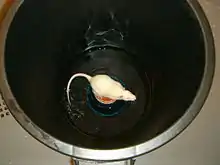Flowerpot technique
The flowerpot technique is used in sleep deprivation studies. It is designed to allow NREM sleep but prevent REM sleep. A laboratory rat is placed on top of an upside down flowerpot which is placed in a bucket of water. While in NREM sleep, the rat retains muscle tone, so it can sleep on top of the flowerpot. When the rat enters REM sleep, it will lose muscle tone and fall off the flowerpot into the water, then climb back up and re-enter NREM sleep.

This rat is being deprived of restful REM sleep by a researcher using the flowerpot technique. The water is within 1 cm of the small flowerpot bottom platform where the rat is standing. At the onset of REM sleep, the rat would either fall into the water only to clamber back to its pot to avoid drowning, or its nose would become submerged into the water shocking it back to an awakened state.
See also
References
- Porkka-Heiskanen, Tarja; Tuomisto, Leena; Ylinen, Markku; Stenberg, Dag (1994). "The effect of REM sleep deprivation on histamine concentrations in different brain areas". Life Sciences. Elsevier BV. 54 (22): 1719–1726. doi:10.1016/0024-3205(94)00612-1. ISSN 0024-3205. PMID 8177013.
- Sayan, Hale; Geli̇r, Ethem; Babül, Aydan (11 December 2001). "Brain Stem and Cerebral Cortex Histamine Concentrations in the Rem Sleep Deprived Rats". Turkish Journal of Medical Sciences. 31 (6): 499–502. ISSN 1300-0144.
- Rosenthal, Martha S. (Summer 1998). "Physiology and neurochemistry of sleep". American Journal of Pharmaceutical Education. 62.
This article is issued from Wikipedia. The text is licensed under Creative Commons - Attribution - Sharealike. Additional terms may apply for the media files.
